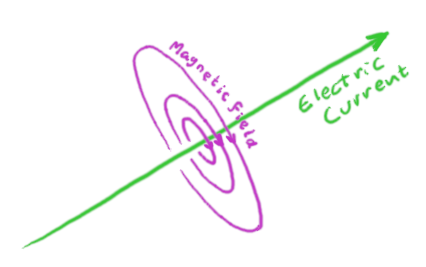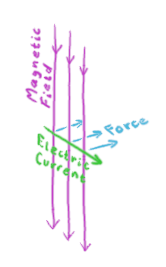Railguns: Difference between revisions
(Created page with "{{PageConstructionNotice}} A railgun is a projectile weapon that uses high electric currents to push a projectile between two rails. The potential advantages of a railgun ar...") |
|||
| Line 4: | Line 4: | ||
== Working principles == | == Working principles == | ||
An electric current creates a magnetic field that circulates around it. If you have two parallel conductors carrying current in opposite directions, they both produce a field that points in the same direction between them, amplifying the field in that direction (likewise, outside the two wires the fields point in opposite directions making the field weaker there and causing it to fall off faster than the field from a single wire). | |||
<div class="center" style="width: auto; margin-left: auto; margin-right: auto;"> | |||
<table><tr><td> | |||
[[File:Amperes_circuit_law.png|426 px|frameless]] | |||
<td> | |||
[[File:Field_from_parallel_wires.png|426 px|frameless]] | |||
<td> | |||
[[File:Lorentz_force_current_magnetic.png|166 px|frameless]] | |||
<tr><td width=426> | |||
The magnetic field (magenta) circulating around a cross sectional plane perpendicular to the direction of an infinite line of current (green). | |||
<td width=426> | |||
The magnetic field (magenta) circulating around a cross sectional plane perpendicular to the direction of two infinite line of current in the opposite directions (green). | |||
<td width=166> | |||
The force on a current due to the magnetic field | |||
</table> | |||
</div> | |||
Revision as of 10:16, 31 March 2024
A railgun is a projectile weapon that uses high electric currents to push a projectile between two rails. The potential advantages of a railgun are high speed projectiles. Disadvantages include rail wear, the need to store large amounts of energy, and the equipment to produce pulses of extreme currents.
Working principles
An electric current creates a magnetic field that circulates around it. If you have two parallel conductors carrying current in opposite directions, they both produce a field that points in the same direction between them, amplifying the field in that direction (likewise, outside the two wires the fields point in opposite directions making the field weaker there and causing it to fall off faster than the field from a single wire).
|
The magnetic field (magenta) circulating around a cross sectional plane perpendicular to the direction of an infinite line of current (green). |
The magnetic field (magenta) circulating around a cross sectional plane perpendicular to the direction of two infinite line of current in the opposite directions (green). |
The force on a current due to the magnetic field |



